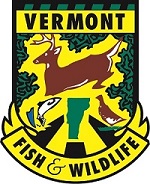
The Vermont Fish & Wildlife Department says bear hunting season starts in September and reminds hunters about the bear hunting regulations.
Vermont has two bear hunting seasons. The early season, which requires a special bear tag, starts September 1, and continues through November 13 with one exception. Nonresident hunters using dogs cannot start bear hunting until September 15. The late bear season begins November 14 and continues through November 22. A hunter may only take one bear during the year.
In addition to a hunting license, a bear hunter using a bow or crossbow must have a prior or current bow license or a certificate proving completion of a bow hunter education course.
The hunter must field dress the bear before taking it to a reporting station. It is also legal to skin the bear and cut it up in order to carry it out of the woods. Although the bear must be reported within 48 hours, Fish & Wildlife urges doing so quickly to cool the meat. The hunter must also collect and submit a pre-molar tooth from the bear at the time the bear is reported or within 30 days. The tooth provides important data on the age structure and size of the bear population.
Upon the request of a game warden, a person harvesting a bear is required to return to the kill site with a game warden.
“Bears will be feeding along power lines and in forest openings and old fields where berries and apples can be found as well as in forested beech and oak stands,” said Vermont’s bear biologist Forrest Hammond. “They also are likely to be feeding on standing corn.”
Hammond says Vermont’s regulated bear hunting seasons help in managing the state’s population.
“Fifty years ago Vermont had less than 1,500 bears, and they were found mostly in the mountains and northeastern quarter of the state,” he said. “Although we have successfully increased bear numbers to approximately three times that number, the human population has also risen, resulting in more encounters between humans and bears. Carefully regulated hunting helps control the growth of the black bear population and allows for their sustainable use, while decreasing interactions with humans.”
Hammond says with bears being so abundant, this is a great opportunity for hunters who have never hunted bear to do so this year. He says properly prepared bear meat is highly nutritious and that recipes are readily available on the Internet as well as in the 2020 Black Bear Hunting Season Guide which is available on the Vermont Fish & Wildlife website.
Hammond recommends that hunters refrain from shooting a bear with cubs as well as bears observed in groups as they are usually made up of sows with cubs.
For Immediate Release: August 13, 2020
Media Contact: Forrest Hammond, 802-777-7493; Mark Scott, 802-777-4217
